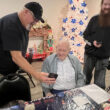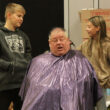Sean C. Morgan
A conversation between members of the Sweet Home Active Revitalization Effort and the Sweet Home Planning Commission Monday night centered on cleaning up Sweet Home’s appearance along Highway 20.
The two groups met to discuss economic development projects and share information during a special meeting of the Planning Commission, which is in the process of reviewing and revising the city’s planning ordinances.
Gary Jarvis, a resident of Sweet Home stressed the need for the city to develop its waterfront property as a commercial destination.
He said the city’s former Public Works maintenance yard off 9th Avenue ought to be rezoned commercial to lure a destination business, like a hotel, restaurant, brew pub or similar service, which would help make Sweet Home “a place people don’t just pass through on their way to somewhere else.”
He specifically suggested that Sweet Home look into bringing a portable ice skating rink, something a community in Humboldt County, Calif., has done for three winters and regularly drawn upward of 16,000 visitors.
“It will bring people from outside the area for something to do in Sweet Home,” he said. The more of this kind of thing that happens, “eventually people will come to Sweet Home to hang out.”
“The Planning Commission has talked about the water, the river being a big asset,” said commission Chairman Lance Gatchell.
“We say we have a big attractive thing in the lake,” said Bill Matthews, a member of SHARE and president of the Chamber of Commerce. Three years ago when he moved to town, he drove to the lake along an unattractive Main Street corridor.
Along the way, he noted houses falling down and buildings, like the former American Family Video store at the corner of 15th and Main, that have been vacant for years.
He asked why the city would allow a building to sit empty for years.
Some call it blight or an eyesore, the kind of thing that reduces neighboring property values, Matthews said.
“It wouldn’t be happening in a lot of cities,” Matthews said. “it would’ve been handled in a variety of ways.”
Dealing with the appearance of Main Street has to be part of the strategy, he said. “We have an opportunity to make some significant changes. Let’s provide a corridor to one of the biggest gems we have.”
Matthews asked about the city’s nuisance and blighted property codes.
The city has ordinances, Jarvis said, but the code enforcement program is complaint-driven.
Community and Economic Development Director Jerry Sorte said that the code enforcement program is soon moving from the Police Department to his department. When the code enforcement officer is hired and goes to work, the officer will proactively patrol the community for code violations.
“I hear about code enforcement every day,” Sorte said. “People want to see code enforcement.”
“We can talk about code enforcement as much as we want, but we have to win the hearts and minds of the people,” said Planning Commissioner Henry Wolthuis. He noted two RVs on his street that haven’t moved for 10 to 15 years. To clean town up, the group needs to change the thinking of the people, “all the garbage collectors. They’re just too darn content to pile up the garbage and live in it.”
One approach is to strong-arm them, Wolthuis said. That’s code enforcement, and the other is to try to build pride in Sweet Home.
Matthews said the community could offer a carrot to ward off the excuses people may give for not cleaning up. It could offer a truck and people to help clean up properties free of charge.
SHARE member Greg Medellin, who is a business adviser with the Linn-Benton Community College Small Business Development Center, said that SHARE is working on a new facade improvement program.
Sorte said the city may be able to help get that going using funds earmarked for economic development.
Members of the group discussed a cleanup day, while Wolthuis said he would research more about Albany’s efforts to clean up in the past couple of years.
Matthews suggested creating a campaign to clean up sweet Home, a campaign “to make Sweet Home sweet or some catchy thing.”
He suggested drawing in the Boys and Girls Club, the schools and churches into community-wide cleanup efforts.
Gatchell said the Planning Commission would keep the conversation in mind as it updates its ordinances.
The city’s code needs to be “living and breathing,” Sorte said. It needs to be updated and changed as issues arise, and the overall process will need to be incremental improvements that are results-driven.
The two groups planned to meet again at a date to be determined as the members of the groups come up with and begin developing ideas for the cleanup effort and projects.




